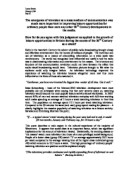With reference to various media, examine the use of sexism. Consider the use of sexism over the years and discuss any developments or changes in recent times
With reference to various media, examine the use of sexism. Consider the use of sexism over the years and discuss any developments or changes in recent times
Sexism is, as defined by the Oxford English Dictionary:-
"(Behaviour, language, etc.) reflecting the assumption that one sex, esp. the female, is inferior to the other; prejudice or discrimination, esp. against women, on the grounds of sex; insistence on (esp. a woman's) conformity to a sexually stereotyped social role."
As this entry in a definitive dictionary suggests, sexism is almost always, and often rightly, associated with prejudice against women. Throughout media and everyday life sexism is considered by many as a subject of humour with little knowledge of the consequences and detrimental effects to the victims of discrimination that can arise from it.
In the media sexist output time and again goes scot-free but seemingly obviously (or half of the title of this essay would not be relevant) things have changed over time.
In a television commercial, a typical part for a female actor would involve the sales pitch for a shampoo or a brand of packaged food. Male actors had a wider choice of roles open to them; depending on the goods being advertised, they could appear as lorry drivers, top executives, airline passengers travelling business class, fishing enthusiasts, buyers of drinks in pubs, and much else.
One such beer advert, for 'Worthingtons' adorns the slogan, "It's a man thing." This is a clear sexist and stereotypical view of men going down the pub, with the 'lads' for a pint. It is all too apparent in modern times that women are just as heavy beer drinkers as men and often frequent their local. The advert is detrimental to the male characters in this instance though, as they are seen as almost slobbish in their nipping for a lager as if it was the most important thing which they had to do.
Sexism is, as defined by the Oxford English Dictionary:-
"(Behaviour, language, etc.) reflecting the assumption that one sex, esp. the female, is inferior to the other; prejudice or discrimination, esp. against women, on the grounds of sex; insistence on (esp. a woman's) conformity to a sexually stereotyped social role."
As this entry in a definitive dictionary suggests, sexism is almost always, and often rightly, associated with prejudice against women. Throughout media and everyday life sexism is considered by many as a subject of humour with little knowledge of the consequences and detrimental effects to the victims of discrimination that can arise from it.
In the media sexist output time and again goes scot-free but seemingly obviously (or half of the title of this essay would not be relevant) things have changed over time.
In a television commercial, a typical part for a female actor would involve the sales pitch for a shampoo or a brand of packaged food. Male actors had a wider choice of roles open to them; depending on the goods being advertised, they could appear as lorry drivers, top executives, airline passengers travelling business class, fishing enthusiasts, buyers of drinks in pubs, and much else.
One such beer advert, for 'Worthingtons' adorns the slogan, "It's a man thing." This is a clear sexist and stereotypical view of men going down the pub, with the 'lads' for a pint. It is all too apparent in modern times that women are just as heavy beer drinkers as men and often frequent their local. The advert is detrimental to the male characters in this instance though, as they are seen as almost slobbish in their nipping for a lager as if it was the most important thing which they had to do.







